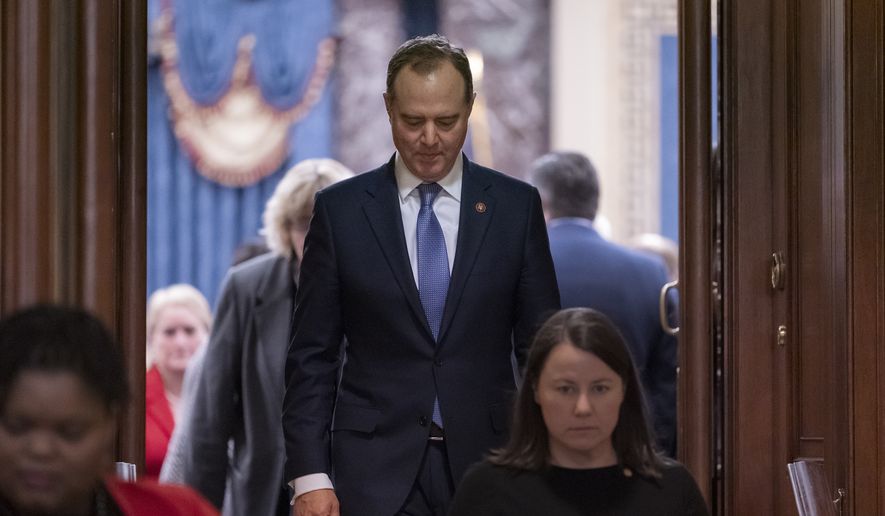Impeachment has now failed for the second time in two decades, leaving constitutional scholars and Congress members alike wondering whether the founders’ political death penalty for presidents has been permanently defanged.
The Senate’s votes to reject both articles against President Trump is the third time an impeachment case has gone to trial and failed. Wednesday’s two votes were the most partisan in history, and proponents were left scratching their heads over what, if anything, could merit impeachment.
“I think what we are learning is that impeachment is no longer effective as a check against presidential misconduct,” Michael Gerhardt, a professor at the University of North Carolina School of Law, told The Washington Times. “As long as a president does not resign, the process is highly unlikely to result in a conviction.”
Rep. Hakeem Jeffries of New York, one of the Democrats’ impeachment managers, put the challenge to senators more directly in closing arguments this week: “To condone the president’s obstruction would strike a deathblow to the impeachment clause.”
Senators voted 52-48 to find Mr. Trump “not guilty” of abuse of power, and 53-47 to acquit him of obstruction of Congress.
It follows the 50-50 and 55-45 votes in 1999 to acquit President Bill Clinton on conduct related to the Paula Jones sexual-harassment lawsuit. President Andrew Johnson, the first to face impeachment in 1868 on a variety of charges related to Reconstruction and his power over the military, was nearly convicted, escaping on a series of 35-19 votes that fell just one senator shy of the two-thirds needed for ouster.
SEE ALSO: Donald Trump acquitted in Senate impeachment trial
President Richard Nixon resigned before the House had a chance to impeach him, though it was believed to be a foregone conclusion that both impeachment and conviction would succeed.
“Johnson showed that impeachment might not work against a really unpopular president, Clinton showed it cannot work against a popular president, Trump showed impeachment cannot work against a president with strong party support,” said Mr. Gerhardt, who served as one of the Democrats’ expert witnesses in the Trump impeachment inquiry.
“Nixon showed that a forced resignation can be effective but that a president who refuses to resign — Johnson, Clinton, and Trump — can endure the process,” he said.
Several Democrats said Mr. Trump’s behavior was worse than Nixon’s, and said it was a grim statement on the viability of impeachment that he couldn’t be removed.
“I think how far the Senate has fallen,” said Sen. Patrick Leahy, a Vermont Democrat who first won his seat in the 1974 post-Watergate election.
Republicans insisted the issue isn’t impeachment itself, but rather the flawed case Democrats brought against Mr. Trump.
Sen. John Cornyn of Texas said if this impeachment had succeeded, it would have been a green light for future Congresses to use it for partisan purposes.
“My greatest fear is it would become a routine process for every president that serves with a House majority of the opposite party,” he said. “We would find ourselves in a recurring impeachment nightmare, every time we elect a new president.”
Wednesday’s defeat doesn’t mean the parties will stop trying, said Josh Blackman, a professor at South Texas College of Law, who said the Clinton and Trump attempts have cheapened impeachment to the point where future House majorities will be more likely to attempt it.
“We’ll probably see the Republicans try to impeach the next Democratic president,” he said. “I don’t want that to happen, but it’s more likely now.”
The Clinton impeachment already opened the floodgates.
In the 24 years between Nixon’s resignation and Mr. Clinton’s impeachment, no presidential impeachment vote reached the House floor. In the 20 years after Clinton, there were two attempts to impeach President George W. Bush, one attempt to impeach Vice President Dick Cheney, and three failed attempts to impeach Mr. Trump, before last year’s successful one.
Yet with Mr. Trump’s acquittal, every one of those efforts has failed, either derailed in the House or defeated in the Senate.
Mr. Blackman, whose work was cited during on the Senate floor during the impeachment trial, said he doesn’t see that outcome changing.
“If there actually is something that is so egregious that on both sides of the aisle people are opposed to it, then you get a resignation,” he said.
Keith E. Whittington, a political scientist at Princeton University, said it’s “probably true” that any president who found himself in Nixon’s situation would resign — though it’s not a given. He wondered whether Nixon, had he dug in and fought the way Mr. Trump and Mr. Clinton did, could also have survived.
“After Clinton, I’m not sure that any president will be as quick as Nixon was to give up the fight,” he said.
The founders gave the power to try impeachments to the Senate, figuring they would act as a more dispassionate arbiter than the House. Yet the 17th Amendment changed that calculus, mandating the direct election of senators and throwing them deeply into party politics.
Mr. Whittington said congressional races are also more closely tied to presidential politics now, meaning presidents have the ability to bring their party members along. Until Sen. Mitt Romney, Utah Republican, voted to convict Mr. Trump on one of the two charges, no senator in history had ever voted to convict a president of his own party.
“Congressional Republicans now see their fate as inevitably tied to Trump’s,” Mr. Whittington said. “There is nothing to be gained by trying to distance themselves from him. Their best option is to fight for him. For the foreseeable future, legislators in both parties are likely to make the same calculation when their president is in trouble.”
• Stephen Dinan can be reached at sdinan@washingtontimes.com.




Please read our comment policy before commenting.